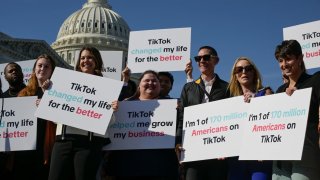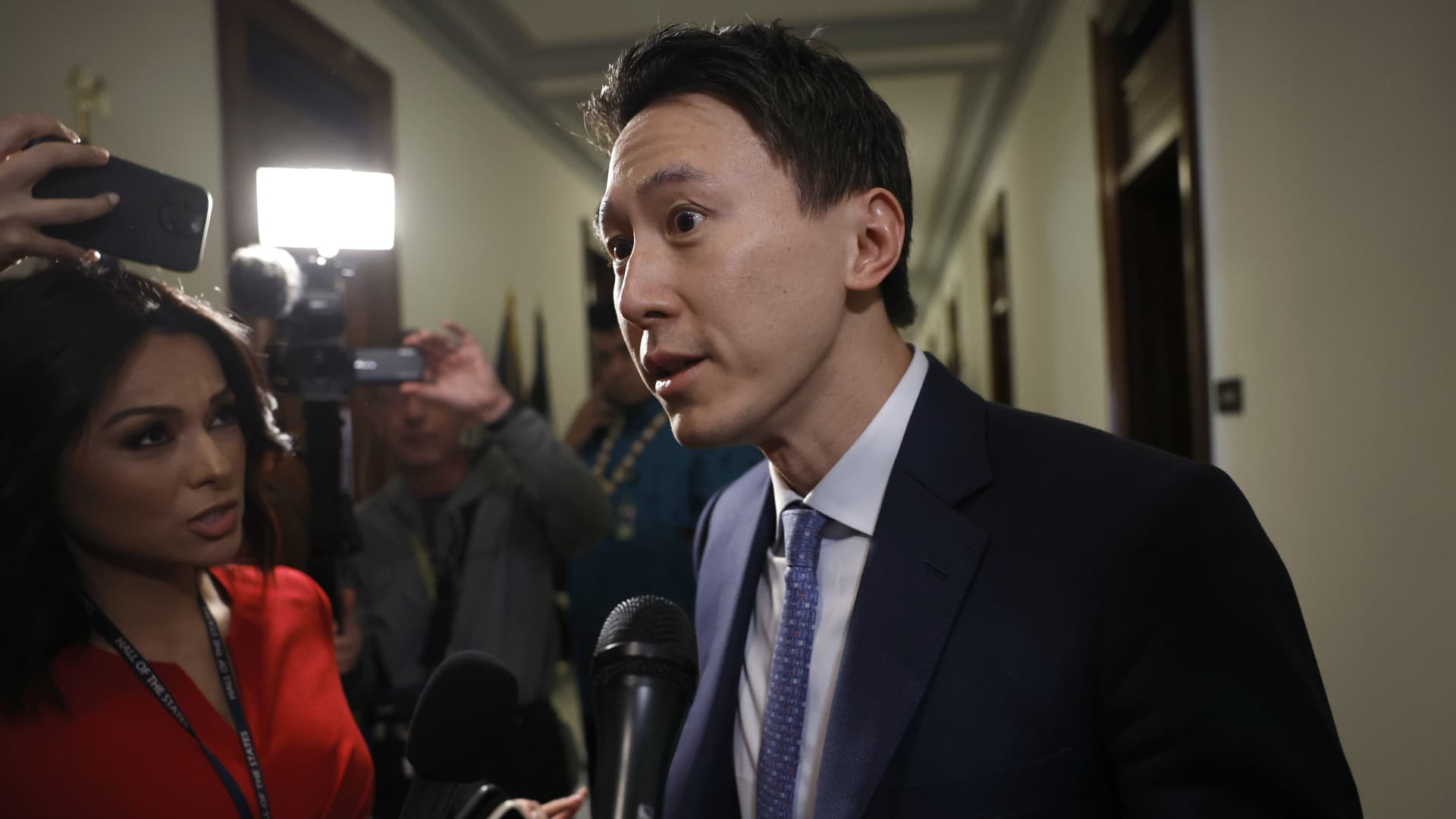
- TikTok creators opposed a bill signed into law by President Joe Biden on Wednesday that would force China's ByteDance to sell the platform to a U.S. company or potentially face a ban.
- "TikTok allows small businesses and creators to find their people in their community," Ophelia Nichols, known as "shoelover99" on the app, told CNBC.
- Lawmakers have argued that TikTok is a national security threat to the U.S.
Ophelia Nichols, known as "shoelover99" on TikTok, is among the scores of online creators and influencers whose livelihood has been suddenly thrown into potential chaos.
Nichols, who lives in Alabama, has over 12.5 million followers on TikTok, an app she uses for creating lifestyle content and delivering rants in her deep Southern accent. Her posts can attract millions of views, and she makes most of her money through promotional partnerships with brands like Home Chef.
But after legislative actions this week in Washington, D.C., Nichols doesn't know what happens next.
On Wednesday, President Joe Biden signed a bill forcing the divestiture of TikTok from Chinese parent ByteDance. If ByteDance doesn't sell TikTok, the app could face a ban in the U.S. The legislation passed the Senate on Tuesday, alongside a package to provide billions of dollars in aid to Israel, Ukraine and Taiwan.
"TikTok allows small businesses and creators to find their people in their community," Nichols told CNBC, ahead of the bill's signing. "It gives everybody the opportunity to be able to provide for their family in a way that they have probably never provided for their family before. It has changed people's lives."
A ban could take years, as TikTok vowed to challenge it in court. But in the meantime, there's a lot of uncertainty.
Money Report
Small and medium-sized businesses that used TikTok supported 224,000 jobs in 2023, according to an Oxford Economics study paid for by TikTok. These businesses generated nearly $15 billion in revenue and contributed $24.2 billion to the U.S. gross domestic product in 2023, the study said.
Get a weekly recap of the latest San Francisco Bay Area housing news. >Sign up for NBC Bay Area’s Housing Deconstructed newsletter.
Nichols joined several other TikTok creators in traveling to the Capitol to oppose a potential ban. She wanted to speak out against it and explain to lawmakers how she runs her business using the app. Nichols said TikTok didn't ask her to join the protest.
"You're taking away our First Amendment rights," Nichols said. "People don't understand. This is a community. It's a family. Whatever it is that you enjoy or that makes you smile, you will find someone else on the app that loves that too."
According to the CNBC All-America Economic Survey from March, nearly half, or 47%, of participants supported a ban or a sale, while just over 30% opposed a ban.
On TikTok itself, there are over 585,000 posts against the ban, predominantly consisting of videos under the hashtags #KeepTikTok and #SaveTikTok. Many testimonials underscore TikTok's significant role in providing online entertainment, while others implore the preservation of the current platform, arguing it's crucial for their livelihoods.
The effort stems from ByteDance's $7 million marketing strategy to mobilize American opposition against the ban. Tactics ranged from heartfelt testimonial videos featuring TikTok CEO Shou Zi Chew to in-app banners advocating for users to call their senator.
Following Biden's signing of the bill on Wednesday, TikTok called the measure unconstitutional and said it would challenge the law in court.
"We believe the facts and the law are clearly on our side, and we will ultimately prevail," the company said in a post on X. "This ban would devastate seven million businesses and silence 170 million Americans."
Lawmakers have long argued that TikTok is a national security threat to the U.S., saying the Chinese government could use the app's data to spy on American users and spread disinformation and conspiracy theories.
'You can still move forward'
Sen. Markwayne Mullin, R-Okla., told CNBC's "Last Call" on Tuesday that the legislation isn't a ban, but just a requirement that TikTok separate itself from ByteDance.
"You can still keep the platform, you can still move forward," Mullin said. "But the Chinese Communist Party is using the algorithm, which they developed, for ByteDance, for TikTok, and the servers that they use to be able to push out their propaganda."
TikTok creators and influencers, living far out of the realm of politics, have a different concern.
Many users of the app have struggled to obtain similar audiences on other platforms. Creators say that each platform is different, with its own audience and interests, and TikTok's algorithm makes it easier for their videos to get discovered by a larger audience.
"People say, 'If we shut down TikTok, they'll go follow you on Meta,' which is not true," said V Spehar, host of "Under the Desk News," a short-form news show with over 3 million followers on TikTok, in an interview with CNBC. "And it's not true for so many people. Otherwise, we would."

TikTok offers various avenues for monetization, including its Creativity Program, designed to reward popular videos that are longer than a minute. Additionally, creators can generate revenue through brand partnerships and affiliate sales via the TikTok Shop, as well as receive virtual "gifts" from followers during livestreams.
Competing platforms have tried to encourage users to post their short-form videos to their platforms. Last year, YouTube Shorts changed its monetization program, offering users 45% of ad revenue across multiple posts. However, users said the payouts weren't as high as on long-form videos.
"The culture of each platform is different," said Spehar. "The discoverability algorithm is different. The saturation is different. Trying to break into YouTube is really hard because it's such a saturated market."
It's gotten harder elsewhere, too. Last year, Meta shut down its program to pay short-form video creators on Instagram and Facebook. Creators have complained that they don't make anything while receiving hundreds of thousands of views on the app. However, Instagram head Adam Mosseri hinted that the program might come back in 2024.
Tony Youn, a plastic surgeon with 8.4 million TikTok followers, said finding a big audience is difficult. His videos on everything from weight loss and plastic surgery to funny clips about sitting in traffic are often viewed hundreds of thousands of times.
"I have purposely diversified just because it's something, as a business person, I know you have to do," Youn said. "But not everybody has done that."
Youn added that part of his anger with the TikTok bill has to do with the fact that there are "people who have much smaller voices than myself who are going to get really hurt by this if this happens."






